Entrepreneurship Report: Entrepreneurial Ventures and Skills Analysis
VerifiedAdded on 2020/06/04
|15
|4255
|35
Report
AI Summary
This report provides a comprehensive analysis of entrepreneurship, examining different types of entrepreneurial ventures, including small-scale enterprises, scalable start-ups, large businesses, and social enterprises. It explores the similarities and differences between various ventures and assesses the impact of micro and small businesses on the economy, supported by data and statistics. The report also identifies the characteristics, traits, and skills of successful entrepreneurs, as well as the aspects of an entrepreneurial personality. Additionally, it discusses the background and experience that can foster entrepreneurship. The report includes an introduction, tasks, and a conclusion, along with references to relevant sources.

ENTREPRENEURSHIP
Paraphrase This Document
Need a fresh take? Get an instant paraphrase of this document with our AI Paraphraser
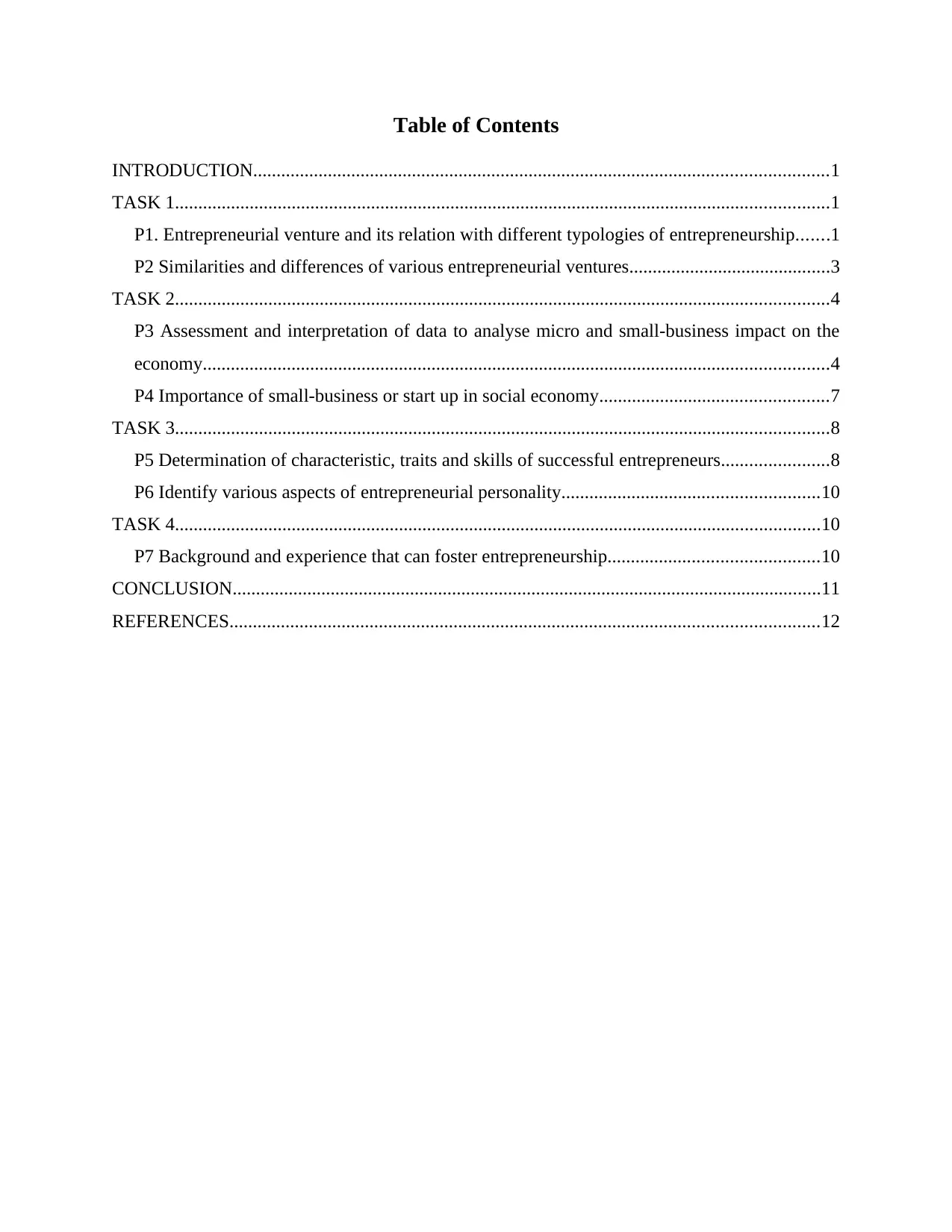
Table of Contents
INTRODUCTION...........................................................................................................................1
TASK 1............................................................................................................................................1
P1. Entrepreneurial venture and its relation with different typologies of entrepreneurship.......1
P2 Similarities and differences of various entrepreneurial ventures...........................................3
TASK 2............................................................................................................................................4
P3 Assessment and interpretation of data to analyse micro and small-business impact on the
economy......................................................................................................................................4
P4 Importance of small-business or start up in social economy.................................................7
TASK 3............................................................................................................................................8
P5 Determination of characteristic, traits and skills of successful entrepreneurs.......................8
P6 Identify various aspects of entrepreneurial personality.......................................................10
TASK 4..........................................................................................................................................10
P7 Background and experience that can foster entrepreneurship.............................................10
CONCLUSION..............................................................................................................................11
REFERENCES..............................................................................................................................12
INTRODUCTION...........................................................................................................................1
TASK 1............................................................................................................................................1
P1. Entrepreneurial venture and its relation with different typologies of entrepreneurship.......1
P2 Similarities and differences of various entrepreneurial ventures...........................................3
TASK 2............................................................................................................................................4
P3 Assessment and interpretation of data to analyse micro and small-business impact on the
economy......................................................................................................................................4
P4 Importance of small-business or start up in social economy.................................................7
TASK 3............................................................................................................................................8
P5 Determination of characteristic, traits and skills of successful entrepreneurs.......................8
P6 Identify various aspects of entrepreneurial personality.......................................................10
TASK 4..........................................................................................................................................10
P7 Background and experience that can foster entrepreneurship.............................................10
CONCLUSION..............................................................................................................................11
REFERENCES..............................................................................................................................12

⊘ This is a preview!⊘
Do you want full access?
Subscribe today to unlock all pages.

Trusted by 1+ million students worldwide
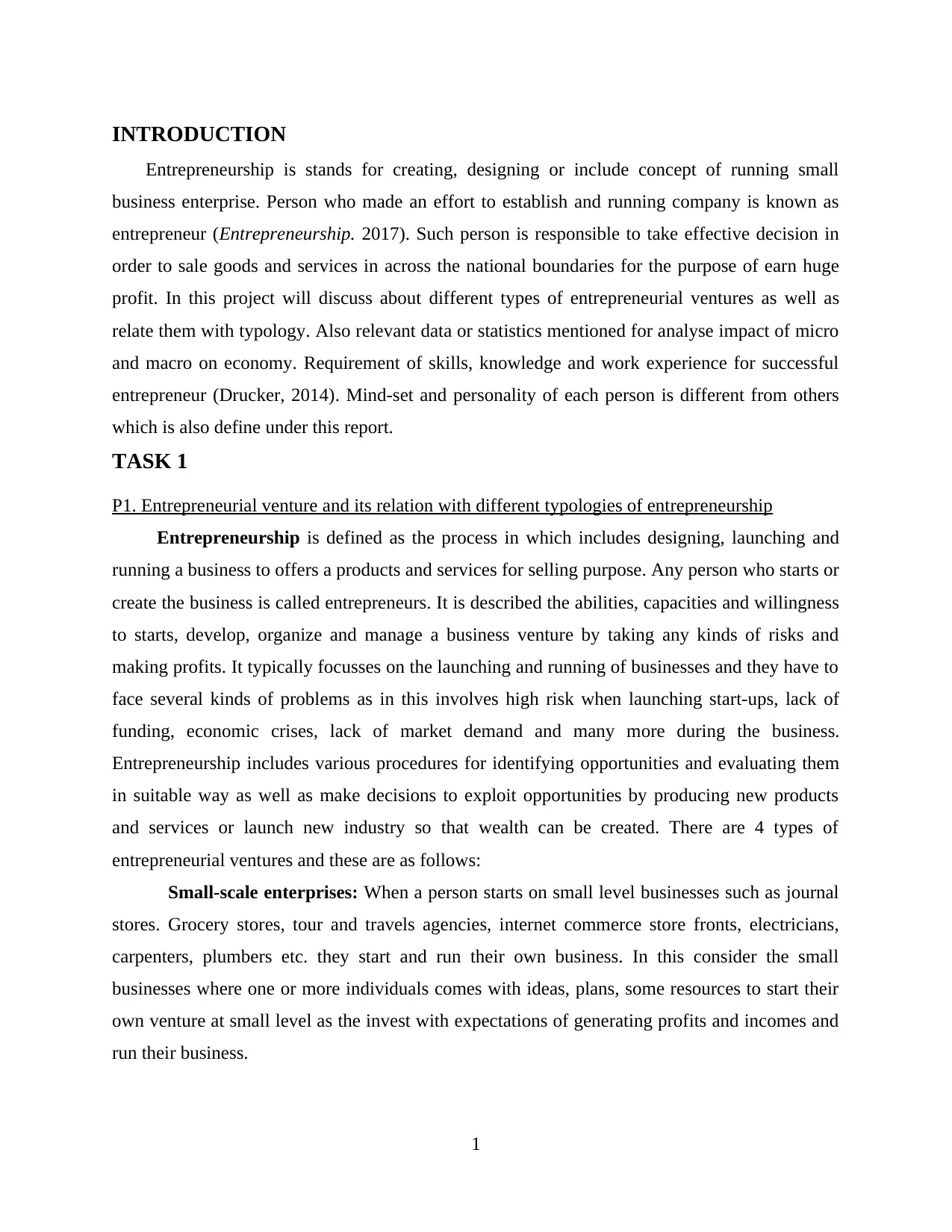
INTRODUCTION
Entrepreneurship is stands for creating, designing or include concept of running small
business enterprise. Person who made an effort to establish and running company is known as
entrepreneur (Entrepreneurship. 2017). Such person is responsible to take effective decision in
order to sale goods and services in across the national boundaries for the purpose of earn huge
profit. In this project will discuss about different types of entrepreneurial ventures as well as
relate them with typology. Also relevant data or statistics mentioned for analyse impact of micro
and macro on economy. Requirement of skills, knowledge and work experience for successful
entrepreneur (Drucker, 2014). Mind-set and personality of each person is different from others
which is also define under this report.
TASK 1
P1. Entrepreneurial venture and its relation with different typologies of entrepreneurship
Entrepreneurship is defined as the process in which includes designing, launching and
running a business to offers a products and services for selling purpose. Any person who starts or
create the business is called entrepreneurs. It is described the abilities, capacities and willingness
to starts, develop, organize and manage a business venture by taking any kinds of risks and
making profits. It typically focusses on the launching and running of businesses and they have to
face several kinds of problems as in this involves high risk when launching start-ups, lack of
funding, economic crises, lack of market demand and many more during the business.
Entrepreneurship includes various procedures for identifying opportunities and evaluating them
in suitable way as well as make decisions to exploit opportunities by producing new products
and services or launch new industry so that wealth can be created. There are 4 types of
entrepreneurial ventures and these are as follows:
Small-scale enterprises: When a person starts on small level businesses such as journal
stores. Grocery stores, tour and travels agencies, internet commerce store fronts, electricians,
carpenters, plumbers etc. they start and run their own business. In this consider the small
businesses where one or more individuals comes with ideas, plans, some resources to start their
own venture at small level as the invest with expectations of generating profits and incomes and
run their business.
1
Entrepreneurship is stands for creating, designing or include concept of running small
business enterprise. Person who made an effort to establish and running company is known as
entrepreneur (Entrepreneurship. 2017). Such person is responsible to take effective decision in
order to sale goods and services in across the national boundaries for the purpose of earn huge
profit. In this project will discuss about different types of entrepreneurial ventures as well as
relate them with typology. Also relevant data or statistics mentioned for analyse impact of micro
and macro on economy. Requirement of skills, knowledge and work experience for successful
entrepreneur (Drucker, 2014). Mind-set and personality of each person is different from others
which is also define under this report.
TASK 1
P1. Entrepreneurial venture and its relation with different typologies of entrepreneurship
Entrepreneurship is defined as the process in which includes designing, launching and
running a business to offers a products and services for selling purpose. Any person who starts or
create the business is called entrepreneurs. It is described the abilities, capacities and willingness
to starts, develop, organize and manage a business venture by taking any kinds of risks and
making profits. It typically focusses on the launching and running of businesses and they have to
face several kinds of problems as in this involves high risk when launching start-ups, lack of
funding, economic crises, lack of market demand and many more during the business.
Entrepreneurship includes various procedures for identifying opportunities and evaluating them
in suitable way as well as make decisions to exploit opportunities by producing new products
and services or launch new industry so that wealth can be created. There are 4 types of
entrepreneurial ventures and these are as follows:
Small-scale enterprises: When a person starts on small level businesses such as journal
stores. Grocery stores, tour and travels agencies, internet commerce store fronts, electricians,
carpenters, plumbers etc. they start and run their own business. In this consider the small
businesses where one or more individuals comes with ideas, plans, some resources to start their
own venture at small level as the invest with expectations of generating profits and incomes and
run their business.
1
Paraphrase This Document
Need a fresh take? Get an instant paraphrase of this document with our AI Paraphraser
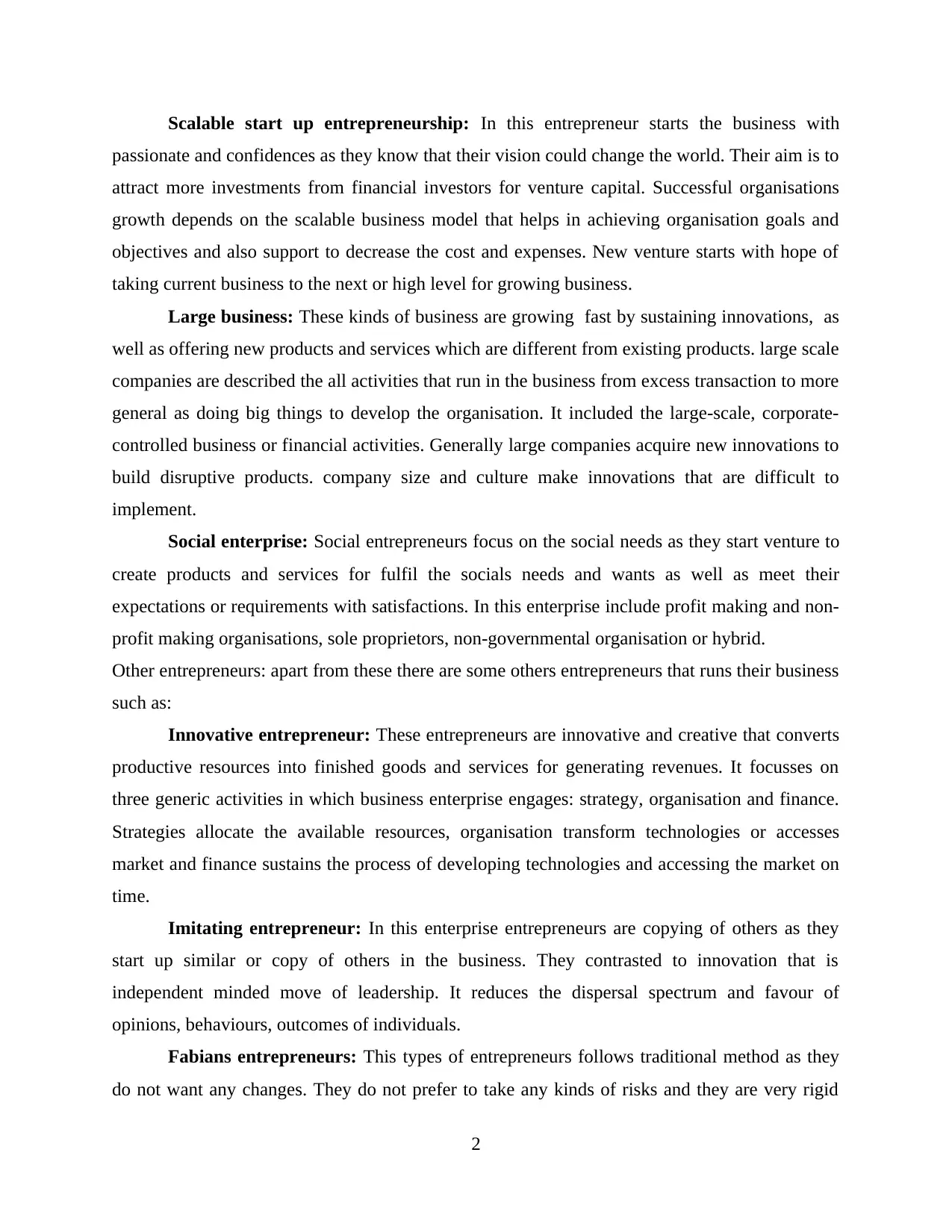
Scalable start up entrepreneurship: In this entrepreneur starts the business with
passionate and confidences as they know that their vision could change the world. Their aim is to
attract more investments from financial investors for venture capital. Successful organisations
growth depends on the scalable business model that helps in achieving organisation goals and
objectives and also support to decrease the cost and expenses. New venture starts with hope of
taking current business to the next or high level for growing business.
Large business: These kinds of business are growing fast by sustaining innovations, as
well as offering new products and services which are different from existing products. large scale
companies are described the all activities that run in the business from excess transaction to more
general as doing big things to develop the organisation. It included the large-scale, corporate-
controlled business or financial activities. Generally large companies acquire new innovations to
build disruptive products. company size and culture make innovations that are difficult to
implement.
Social enterprise: Social entrepreneurs focus on the social needs as they start venture to
create products and services for fulfil the socials needs and wants as well as meet their
expectations or requirements with satisfactions. In this enterprise include profit making and non-
profit making organisations, sole proprietors, non-governmental organisation or hybrid.
Other entrepreneurs: apart from these there are some others entrepreneurs that runs their business
such as:
Innovative entrepreneur: These entrepreneurs are innovative and creative that converts
productive resources into finished goods and services for generating revenues. It focusses on
three generic activities in which business enterprise engages: strategy, organisation and finance.
Strategies allocate the available resources, organisation transform technologies or accesses
market and finance sustains the process of developing technologies and accessing the market on
time.
Imitating entrepreneur: In this enterprise entrepreneurs are copying of others as they
start up similar or copy of others in the business. They contrasted to innovation that is
independent minded move of leadership. It reduces the dispersal spectrum and favour of
opinions, behaviours, outcomes of individuals.
Fabians entrepreneurs: This types of entrepreneurs follows traditional method as they
do not want any changes. They do not prefer to take any kinds of risks and they are very rigid
2
passionate and confidences as they know that their vision could change the world. Their aim is to
attract more investments from financial investors for venture capital. Successful organisations
growth depends on the scalable business model that helps in achieving organisation goals and
objectives and also support to decrease the cost and expenses. New venture starts with hope of
taking current business to the next or high level for growing business.
Large business: These kinds of business are growing fast by sustaining innovations, as
well as offering new products and services which are different from existing products. large scale
companies are described the all activities that run in the business from excess transaction to more
general as doing big things to develop the organisation. It included the large-scale, corporate-
controlled business or financial activities. Generally large companies acquire new innovations to
build disruptive products. company size and culture make innovations that are difficult to
implement.
Social enterprise: Social entrepreneurs focus on the social needs as they start venture to
create products and services for fulfil the socials needs and wants as well as meet their
expectations or requirements with satisfactions. In this enterprise include profit making and non-
profit making organisations, sole proprietors, non-governmental organisation or hybrid.
Other entrepreneurs: apart from these there are some others entrepreneurs that runs their business
such as:
Innovative entrepreneur: These entrepreneurs are innovative and creative that converts
productive resources into finished goods and services for generating revenues. It focusses on
three generic activities in which business enterprise engages: strategy, organisation and finance.
Strategies allocate the available resources, organisation transform technologies or accesses
market and finance sustains the process of developing technologies and accessing the market on
time.
Imitating entrepreneur: In this enterprise entrepreneurs are copying of others as they
start up similar or copy of others in the business. They contrasted to innovation that is
independent minded move of leadership. It reduces the dispersal spectrum and favour of
opinions, behaviours, outcomes of individuals.
Fabians entrepreneurs: This types of entrepreneurs follows traditional method as they
do not want any changes. They do not prefer to take any kinds of risks and they are very rigid
2
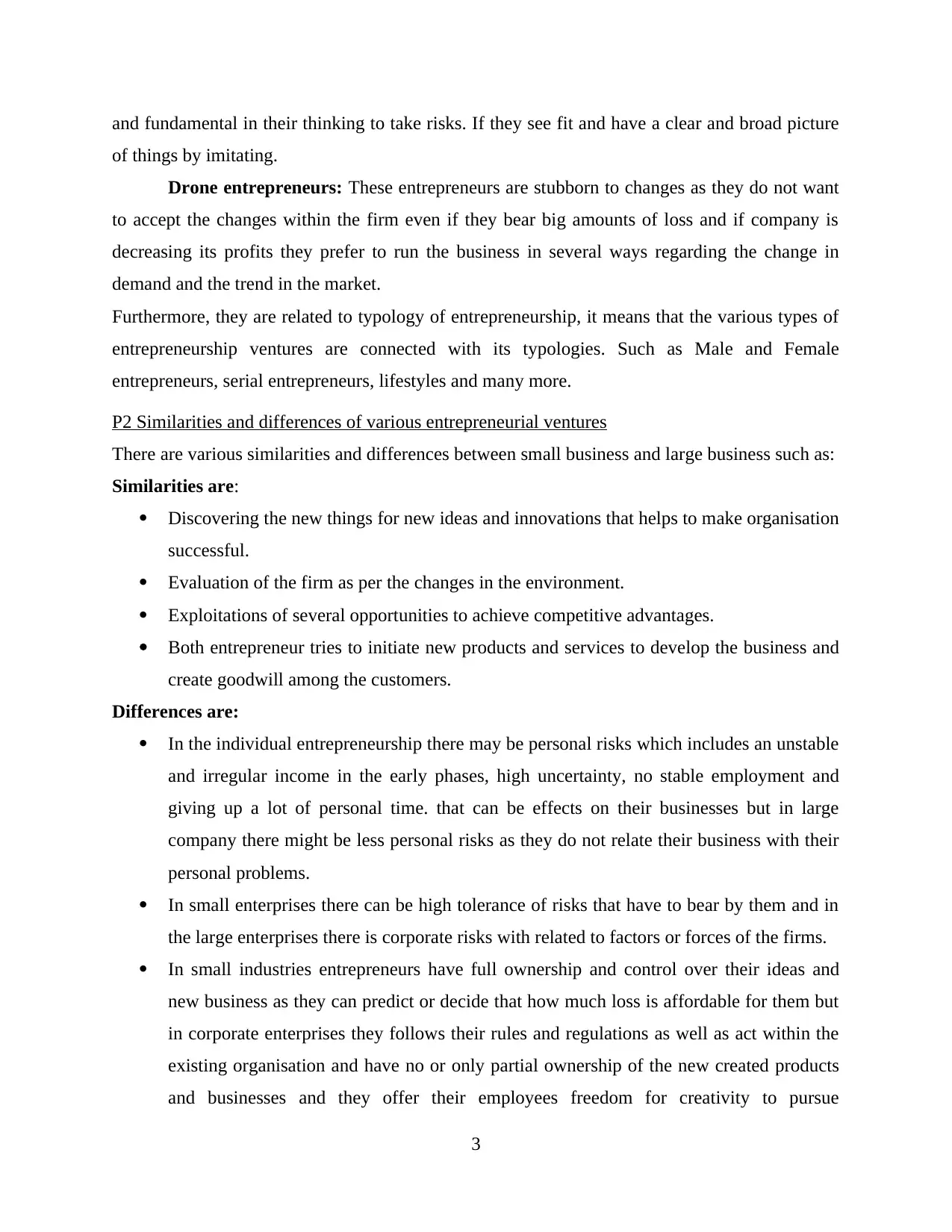
and fundamental in their thinking to take risks. If they see fit and have a clear and broad picture
of things by imitating.
Drone entrepreneurs: These entrepreneurs are stubborn to changes as they do not want
to accept the changes within the firm even if they bear big amounts of loss and if company is
decreasing its profits they prefer to run the business in several ways regarding the change in
demand and the trend in the market.
Furthermore, they are related to typology of entrepreneurship, it means that the various types of
entrepreneurship ventures are connected with its typologies. Such as Male and Female
entrepreneurs, serial entrepreneurs, lifestyles and many more.
P2 Similarities and differences of various entrepreneurial ventures
There are various similarities and differences between small business and large business such as:
Similarities are:
Discovering the new things for new ideas and innovations that helps to make organisation
successful.
Evaluation of the firm as per the changes in the environment.
Exploitations of several opportunities to achieve competitive advantages.
Both entrepreneur tries to initiate new products and services to develop the business and
create goodwill among the customers.
Differences are:
In the individual entrepreneurship there may be personal risks which includes an unstable
and irregular income in the early phases, high uncertainty, no stable employment and
giving up a lot of personal time. that can be effects on their businesses but in large
company there might be less personal risks as they do not relate their business with their
personal problems.
In small enterprises there can be high tolerance of risks that have to bear by them and in
the large enterprises there is corporate risks with related to factors or forces of the firms.
In small industries entrepreneurs have full ownership and control over their ideas and
new business as they can predict or decide that how much loss is affordable for them but
in corporate enterprises they follows their rules and regulations as well as act within the
existing organisation and have no or only partial ownership of the new created products
and businesses and they offer their employees freedom for creativity to pursue
3
of things by imitating.
Drone entrepreneurs: These entrepreneurs are stubborn to changes as they do not want
to accept the changes within the firm even if they bear big amounts of loss and if company is
decreasing its profits they prefer to run the business in several ways regarding the change in
demand and the trend in the market.
Furthermore, they are related to typology of entrepreneurship, it means that the various types of
entrepreneurship ventures are connected with its typologies. Such as Male and Female
entrepreneurs, serial entrepreneurs, lifestyles and many more.
P2 Similarities and differences of various entrepreneurial ventures
There are various similarities and differences between small business and large business such as:
Similarities are:
Discovering the new things for new ideas and innovations that helps to make organisation
successful.
Evaluation of the firm as per the changes in the environment.
Exploitations of several opportunities to achieve competitive advantages.
Both entrepreneur tries to initiate new products and services to develop the business and
create goodwill among the customers.
Differences are:
In the individual entrepreneurship there may be personal risks which includes an unstable
and irregular income in the early phases, high uncertainty, no stable employment and
giving up a lot of personal time. that can be effects on their businesses but in large
company there might be less personal risks as they do not relate their business with their
personal problems.
In small enterprises there can be high tolerance of risks that have to bear by them and in
the large enterprises there is corporate risks with related to factors or forces of the firms.
In small industries entrepreneurs have full ownership and control over their ideas and
new business as they can predict or decide that how much loss is affordable for them but
in corporate enterprises they follows their rules and regulations as well as act within the
existing organisation and have no or only partial ownership of the new created products
and businesses and they offer their employees freedom for creativity to pursue
3
⊘ This is a preview!⊘
Do you want full access?
Subscribe today to unlock all pages.

Trusted by 1+ million students worldwide
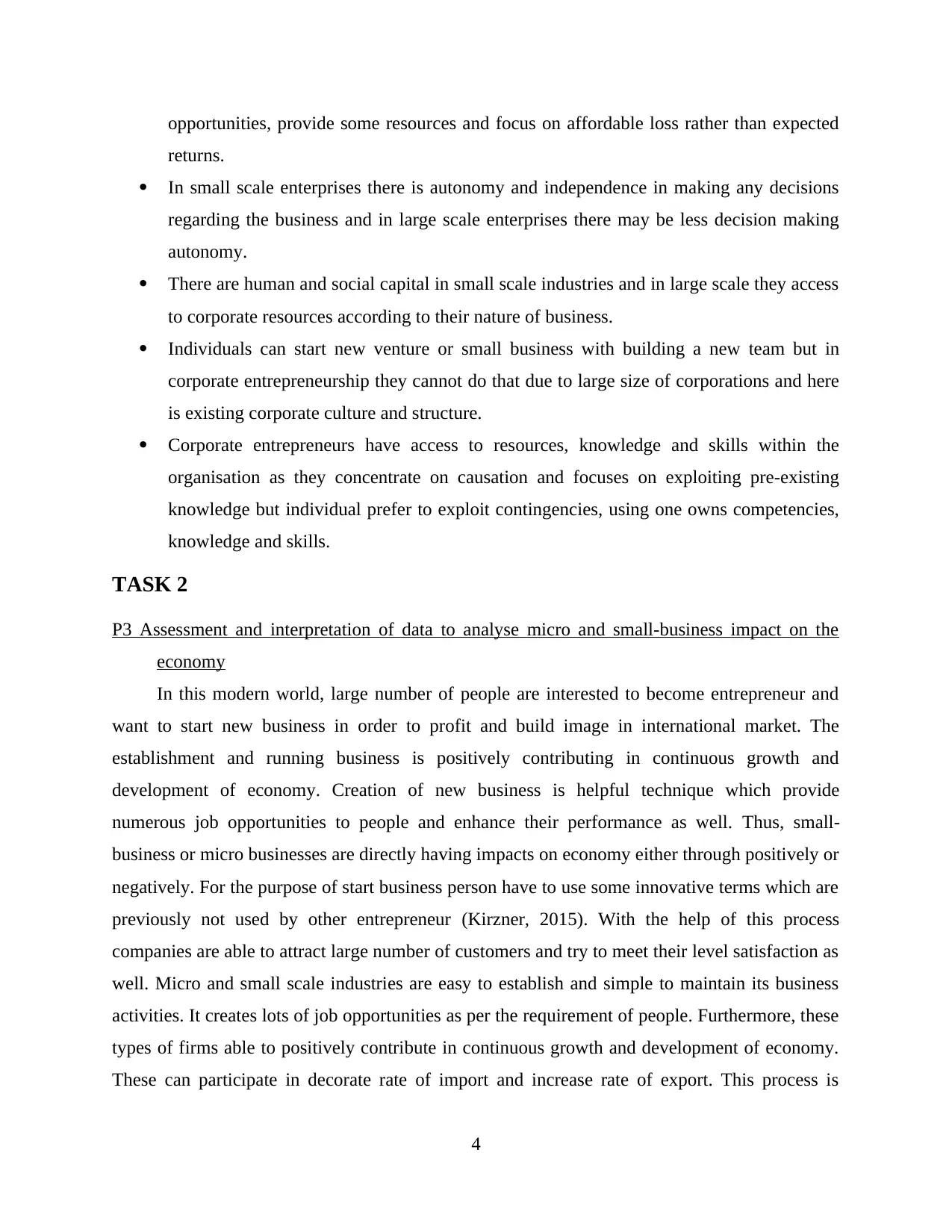
opportunities, provide some resources and focus on affordable loss rather than expected
returns.
In small scale enterprises there is autonomy and independence in making any decisions
regarding the business and in large scale enterprises there may be less decision making
autonomy.
There are human and social capital in small scale industries and in large scale they access
to corporate resources according to their nature of business.
Individuals can start new venture or small business with building a new team but in
corporate entrepreneurship they cannot do that due to large size of corporations and here
is existing corporate culture and structure.
Corporate entrepreneurs have access to resources, knowledge and skills within the
organisation as they concentrate on causation and focuses on exploiting pre-existing
knowledge but individual prefer to exploit contingencies, using one owns competencies,
knowledge and skills.
TASK 2
P3 Assessment and interpretation of data to analyse micro and small-business impact on the
economy
In this modern world, large number of people are interested to become entrepreneur and
want to start new business in order to profit and build image in international market. The
establishment and running business is positively contributing in continuous growth and
development of economy. Creation of new business is helpful technique which provide
numerous job opportunities to people and enhance their performance as well. Thus, small-
business or micro businesses are directly having impacts on economy either through positively or
negatively. For the purpose of start business person have to use some innovative terms which are
previously not used by other entrepreneur (Kirzner, 2015). With the help of this process
companies are able to attract large number of customers and try to meet their level satisfaction as
well. Micro and small scale industries are easy to establish and simple to maintain its business
activities. It creates lots of job opportunities as per the requirement of people. Furthermore, these
types of firms able to positively contribute in continuous growth and development of economy.
These can participate in decorate rate of import and increase rate of export. This process is
4
returns.
In small scale enterprises there is autonomy and independence in making any decisions
regarding the business and in large scale enterprises there may be less decision making
autonomy.
There are human and social capital in small scale industries and in large scale they access
to corporate resources according to their nature of business.
Individuals can start new venture or small business with building a new team but in
corporate entrepreneurship they cannot do that due to large size of corporations and here
is existing corporate culture and structure.
Corporate entrepreneurs have access to resources, knowledge and skills within the
organisation as they concentrate on causation and focuses on exploiting pre-existing
knowledge but individual prefer to exploit contingencies, using one owns competencies,
knowledge and skills.
TASK 2
P3 Assessment and interpretation of data to analyse micro and small-business impact on the
economy
In this modern world, large number of people are interested to become entrepreneur and
want to start new business in order to profit and build image in international market. The
establishment and running business is positively contributing in continuous growth and
development of economy. Creation of new business is helpful technique which provide
numerous job opportunities to people and enhance their performance as well. Thus, small-
business or micro businesses are directly having impacts on economy either through positively or
negatively. For the purpose of start business person have to use some innovative terms which are
previously not used by other entrepreneur (Kirzner, 2015). With the help of this process
companies are able to attract large number of customers and try to meet their level satisfaction as
well. Micro and small scale industries are easy to establish and simple to maintain its business
activities. It creates lots of job opportunities as per the requirement of people. Furthermore, these
types of firms able to positively contribute in continuous growth and development of economy.
These can participate in decorate rate of import and increase rate of export. This process is
4
Paraphrase This Document
Need a fresh take? Get an instant paraphrase of this document with our AI Paraphraser
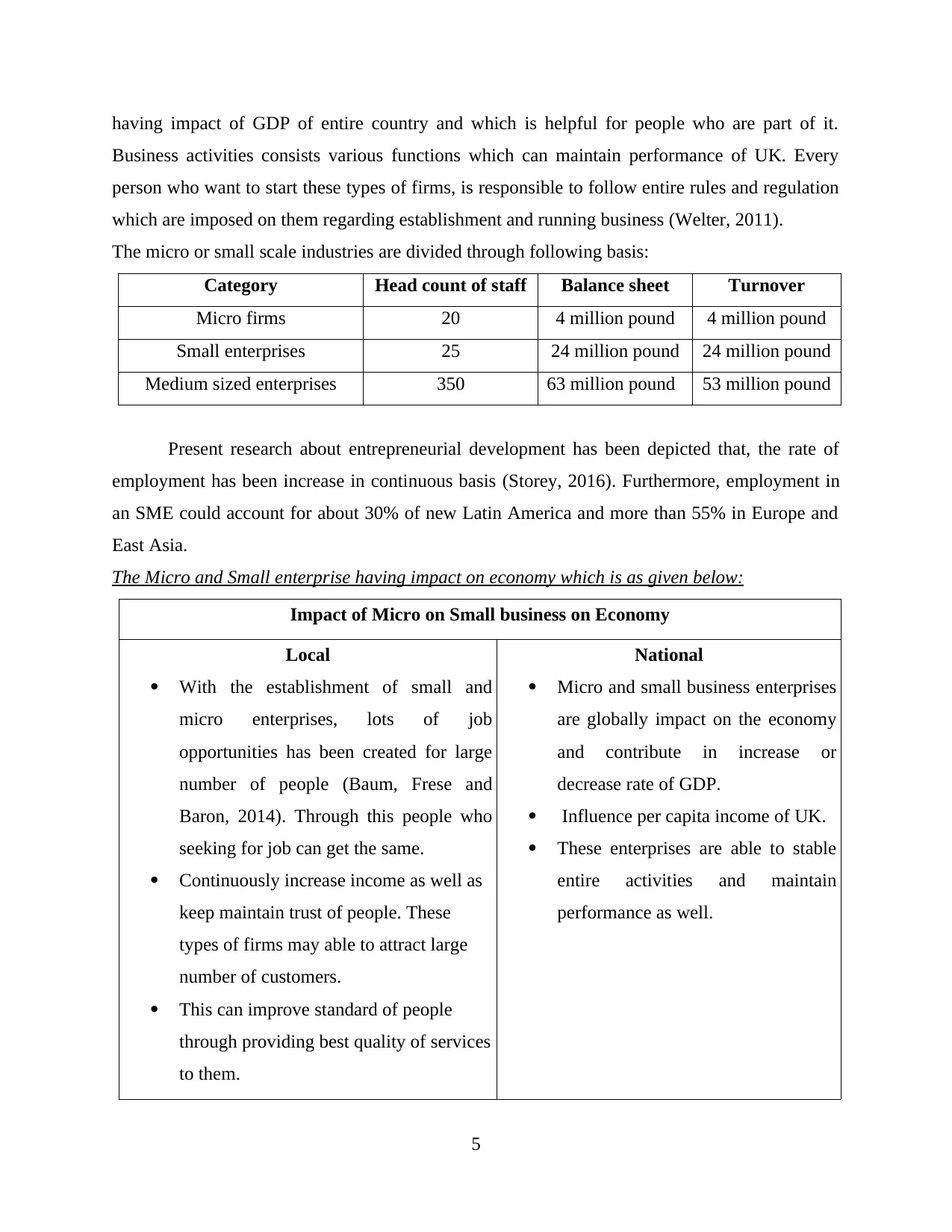
having impact of GDP of entire country and which is helpful for people who are part of it.
Business activities consists various functions which can maintain performance of UK. Every
person who want to start these types of firms, is responsible to follow entire rules and regulation
which are imposed on them regarding establishment and running business (Welter, 2011).
The micro or small scale industries are divided through following basis:
Category Head count of staff Balance sheet Turnover
Micro firms 20 4 million pound 4 million pound
Small enterprises 25 24 million pound 24 million pound
Medium sized enterprises 350 63 million pound 53 million pound
Present research about entrepreneurial development has been depicted that, the rate of
employment has been increase in continuous basis (Storey, 2016). Furthermore, employment in
an SME could account for about 30% of new Latin America and more than 55% in Europe and
East Asia.
The Micro and Small enterprise having impact on economy which is as given below:
Impact of Micro on Small business on Economy
Local
With the establishment of small and
micro enterprises, lots of job
opportunities has been created for large
number of people (Baum, Frese and
Baron, 2014). Through this people who
seeking for job can get the same.
Continuously increase income as well as
keep maintain trust of people. These
types of firms may able to attract large
number of customers.
This can improve standard of people
through providing best quality of services
to them.
National
Micro and small business enterprises
are globally impact on the economy
and contribute in increase or
decrease rate of GDP.
Influence per capita income of UK.
These enterprises are able to stable
entire activities and maintain
performance as well.
5
Business activities consists various functions which can maintain performance of UK. Every
person who want to start these types of firms, is responsible to follow entire rules and regulation
which are imposed on them regarding establishment and running business (Welter, 2011).
The micro or small scale industries are divided through following basis:
Category Head count of staff Balance sheet Turnover
Micro firms 20 4 million pound 4 million pound
Small enterprises 25 24 million pound 24 million pound
Medium sized enterprises 350 63 million pound 53 million pound
Present research about entrepreneurial development has been depicted that, the rate of
employment has been increase in continuous basis (Storey, 2016). Furthermore, employment in
an SME could account for about 30% of new Latin America and more than 55% in Europe and
East Asia.
The Micro and Small enterprise having impact on economy which is as given below:
Impact of Micro on Small business on Economy
Local
With the establishment of small and
micro enterprises, lots of job
opportunities has been created for large
number of people (Baum, Frese and
Baron, 2014). Through this people who
seeking for job can get the same.
Continuously increase income as well as
keep maintain trust of people. These
types of firms may able to attract large
number of customers.
This can improve standard of people
through providing best quality of services
to them.
National
Micro and small business enterprises
are globally impact on the economy
and contribute in increase or
decrease rate of GDP.
Influence per capita income of UK.
These enterprises are able to stable
entire activities and maintain
performance as well.
5
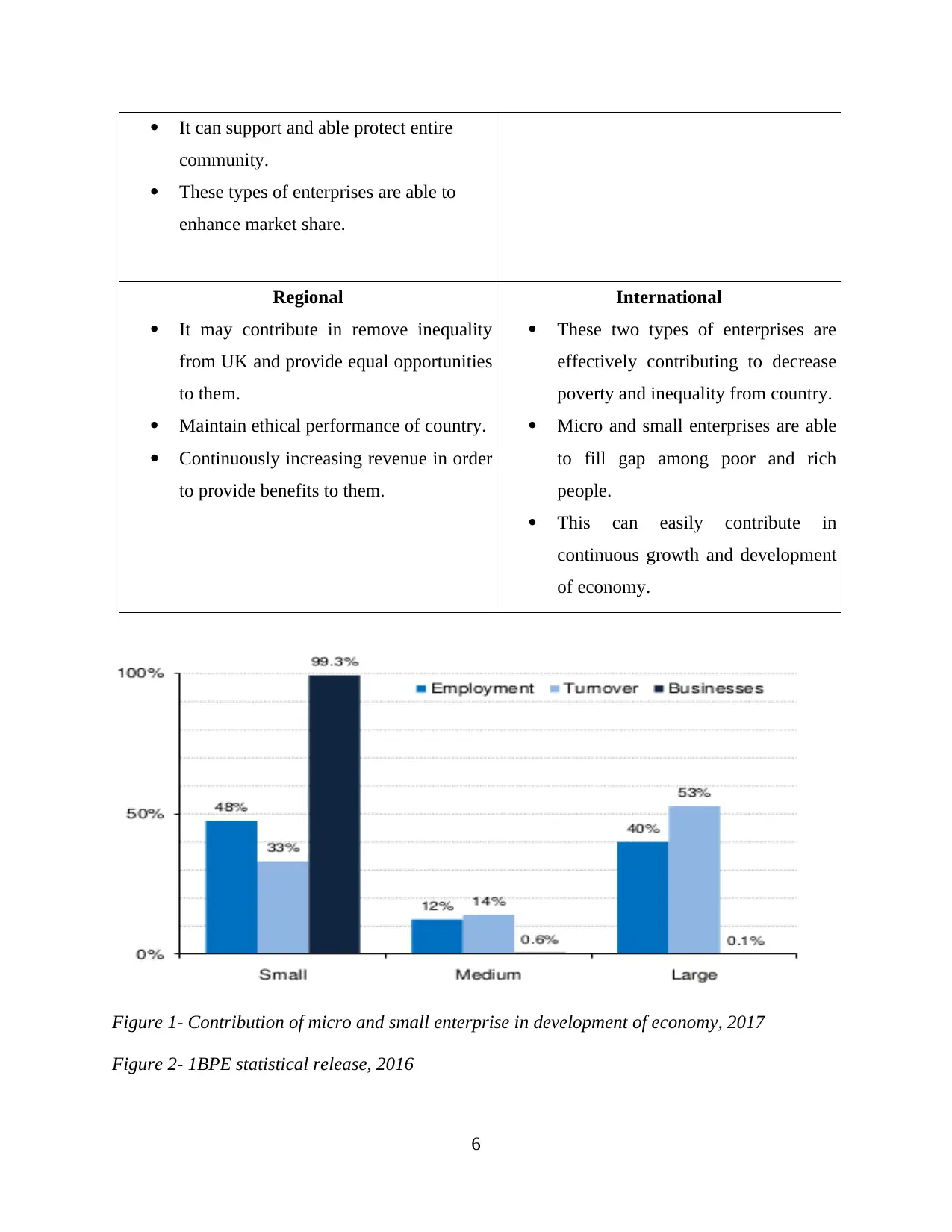
It can support and able protect entire
community.
These types of enterprises are able to
enhance market share.
Regional
It may contribute in remove inequality
from UK and provide equal opportunities
to them.
Maintain ethical performance of country.
Continuously increasing revenue in order
to provide benefits to them.
International
These two types of enterprises are
effectively contributing to decrease
poverty and inequality from country.
Micro and small enterprises are able
to fill gap among poor and rich
people.
This can easily contribute in
continuous growth and development
of economy.
Figure 1- Contribution of micro and small enterprise in development of economy, 2017
Figure 2- 1BPE statistical release, 2016
6
community.
These types of enterprises are able to
enhance market share.
Regional
It may contribute in remove inequality
from UK and provide equal opportunities
to them.
Maintain ethical performance of country.
Continuously increasing revenue in order
to provide benefits to them.
International
These two types of enterprises are
effectively contributing to decrease
poverty and inequality from country.
Micro and small enterprises are able
to fill gap among poor and rich
people.
This can easily contribute in
continuous growth and development
of economy.
Figure 1- Contribution of micro and small enterprise in development of economy, 2017
Figure 2- 1BPE statistical release, 2016
6
⊘ This is a preview!⊘
Do you want full access?
Subscribe today to unlock all pages.

Trusted by 1+ million students worldwide
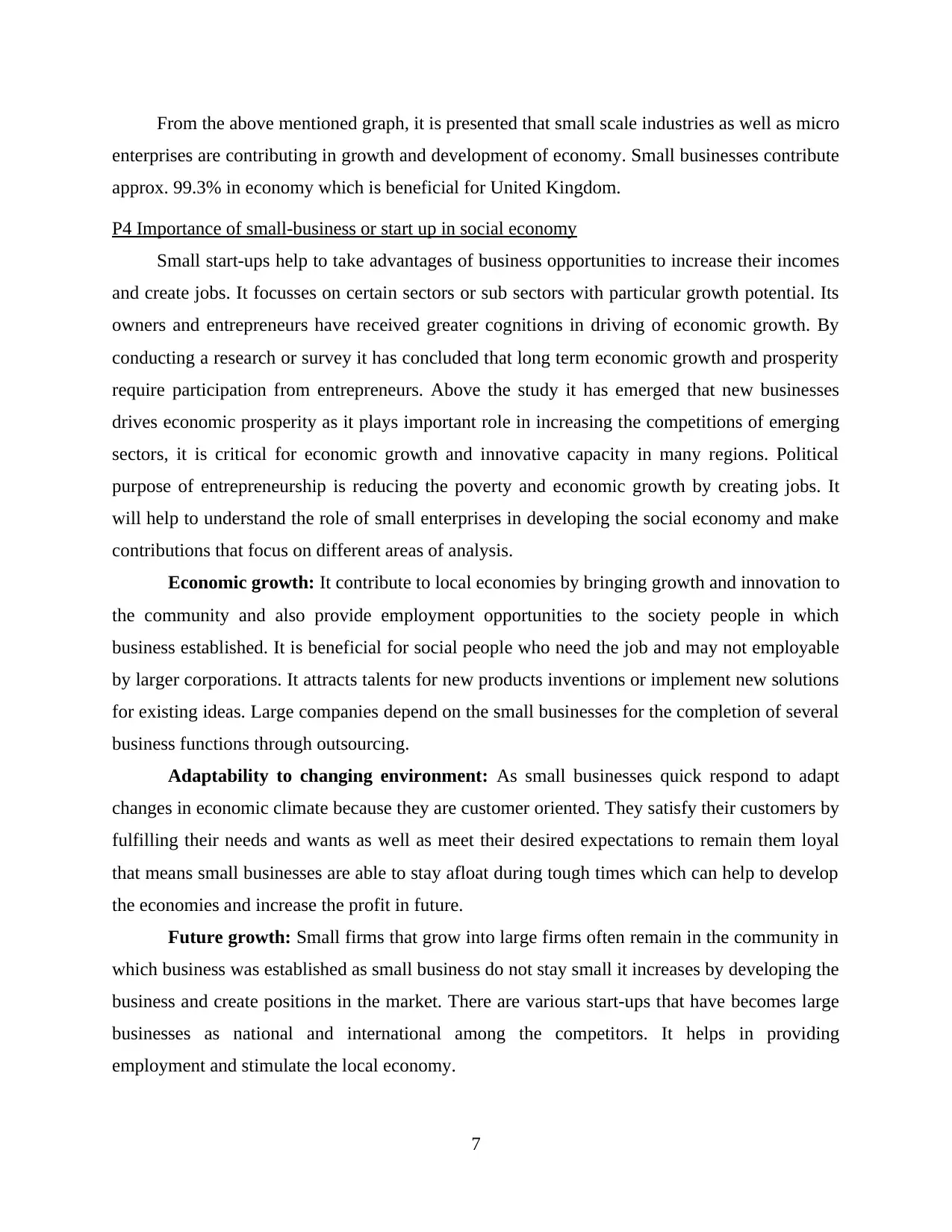
From the above mentioned graph, it is presented that small scale industries as well as micro
enterprises are contributing in growth and development of economy. Small businesses contribute
approx. 99.3% in economy which is beneficial for United Kingdom.
P4 Importance of small-business or start up in social economy
Small start-ups help to take advantages of business opportunities to increase their incomes
and create jobs. It focusses on certain sectors or sub sectors with particular growth potential. Its
owners and entrepreneurs have received greater cognitions in driving of economic growth. By
conducting a research or survey it has concluded that long term economic growth and prosperity
require participation from entrepreneurs. Above the study it has emerged that new businesses
drives economic prosperity as it plays important role in increasing the competitions of emerging
sectors, it is critical for economic growth and innovative capacity in many regions. Political
purpose of entrepreneurship is reducing the poverty and economic growth by creating jobs. It
will help to understand the role of small enterprises in developing the social economy and make
contributions that focus on different areas of analysis.
Economic growth: It contribute to local economies by bringing growth and innovation to
the community and also provide employment opportunities to the society people in which
business established. It is beneficial for social people who need the job and may not employable
by larger corporations. It attracts talents for new products inventions or implement new solutions
for existing ideas. Large companies depend on the small businesses for the completion of several
business functions through outsourcing.
Adaptability to changing environment: As small businesses quick respond to adapt
changes in economic climate because they are customer oriented. They satisfy their customers by
fulfilling their needs and wants as well as meet their desired expectations to remain them loyal
that means small businesses are able to stay afloat during tough times which can help to develop
the economies and increase the profit in future.
Future growth: Small firms that grow into large firms often remain in the community in
which business was established as small business do not stay small it increases by developing the
business and create positions in the market. There are various start-ups that have becomes large
businesses as national and international among the competitors. It helps in providing
employment and stimulate the local economy.
7
enterprises are contributing in growth and development of economy. Small businesses contribute
approx. 99.3% in economy which is beneficial for United Kingdom.
P4 Importance of small-business or start up in social economy
Small start-ups help to take advantages of business opportunities to increase their incomes
and create jobs. It focusses on certain sectors or sub sectors with particular growth potential. Its
owners and entrepreneurs have received greater cognitions in driving of economic growth. By
conducting a research or survey it has concluded that long term economic growth and prosperity
require participation from entrepreneurs. Above the study it has emerged that new businesses
drives economic prosperity as it plays important role in increasing the competitions of emerging
sectors, it is critical for economic growth and innovative capacity in many regions. Political
purpose of entrepreneurship is reducing the poverty and economic growth by creating jobs. It
will help to understand the role of small enterprises in developing the social economy and make
contributions that focus on different areas of analysis.
Economic growth: It contribute to local economies by bringing growth and innovation to
the community and also provide employment opportunities to the society people in which
business established. It is beneficial for social people who need the job and may not employable
by larger corporations. It attracts talents for new products inventions or implement new solutions
for existing ideas. Large companies depend on the small businesses for the completion of several
business functions through outsourcing.
Adaptability to changing environment: As small businesses quick respond to adapt
changes in economic climate because they are customer oriented. They satisfy their customers by
fulfilling their needs and wants as well as meet their desired expectations to remain them loyal
that means small businesses are able to stay afloat during tough times which can help to develop
the economies and increase the profit in future.
Future growth: Small firms that grow into large firms often remain in the community in
which business was established as small business do not stay small it increases by developing the
business and create positions in the market. There are various start-ups that have becomes large
businesses as national and international among the competitors. It helps in providing
employment and stimulate the local economy.
7
Paraphrase This Document
Need a fresh take? Get an instant paraphrase of this document with our AI Paraphraser
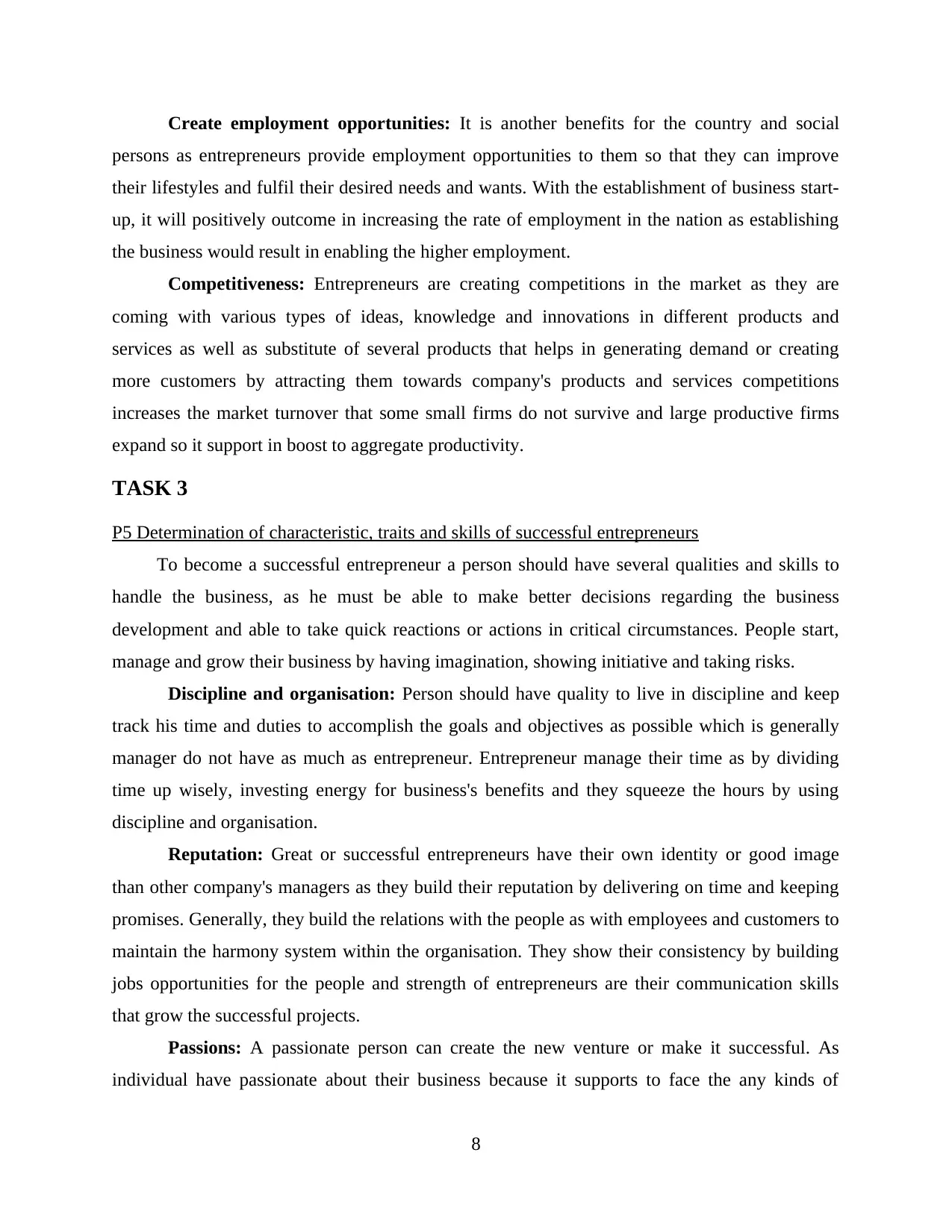
Create employment opportunities: It is another benefits for the country and social
persons as entrepreneurs provide employment opportunities to them so that they can improve
their lifestyles and fulfil their desired needs and wants. With the establishment of business start-
up, it will positively outcome in increasing the rate of employment in the nation as establishing
the business would result in enabling the higher employment.
Competitiveness: Entrepreneurs are creating competitions in the market as they are
coming with various types of ideas, knowledge and innovations in different products and
services as well as substitute of several products that helps in generating demand or creating
more customers by attracting them towards company's products and services competitions
increases the market turnover that some small firms do not survive and large productive firms
expand so it support in boost to aggregate productivity.
TASK 3
P5 Determination of characteristic, traits and skills of successful entrepreneurs
To become a successful entrepreneur a person should have several qualities and skills to
handle the business, as he must be able to make better decisions regarding the business
development and able to take quick reactions or actions in critical circumstances. People start,
manage and grow their business by having imagination, showing initiative and taking risks.
Discipline and organisation: Person should have quality to live in discipline and keep
track his time and duties to accomplish the goals and objectives as possible which is generally
manager do not have as much as entrepreneur. Entrepreneur manage their time as by dividing
time up wisely, investing energy for business's benefits and they squeeze the hours by using
discipline and organisation.
Reputation: Great or successful entrepreneurs have their own identity or good image
than other company's managers as they build their reputation by delivering on time and keeping
promises. Generally, they build the relations with the people as with employees and customers to
maintain the harmony system within the organisation. They show their consistency by building
jobs opportunities for the people and strength of entrepreneurs are their communication skills
that grow the successful projects.
Passions: A passionate person can create the new venture or make it successful. As
individual have passionate about their business because it supports to face the any kinds of
8
persons as entrepreneurs provide employment opportunities to them so that they can improve
their lifestyles and fulfil their desired needs and wants. With the establishment of business start-
up, it will positively outcome in increasing the rate of employment in the nation as establishing
the business would result in enabling the higher employment.
Competitiveness: Entrepreneurs are creating competitions in the market as they are
coming with various types of ideas, knowledge and innovations in different products and
services as well as substitute of several products that helps in generating demand or creating
more customers by attracting them towards company's products and services competitions
increases the market turnover that some small firms do not survive and large productive firms
expand so it support in boost to aggregate productivity.
TASK 3
P5 Determination of characteristic, traits and skills of successful entrepreneurs
To become a successful entrepreneur a person should have several qualities and skills to
handle the business, as he must be able to make better decisions regarding the business
development and able to take quick reactions or actions in critical circumstances. People start,
manage and grow their business by having imagination, showing initiative and taking risks.
Discipline and organisation: Person should have quality to live in discipline and keep
track his time and duties to accomplish the goals and objectives as possible which is generally
manager do not have as much as entrepreneur. Entrepreneur manage their time as by dividing
time up wisely, investing energy for business's benefits and they squeeze the hours by using
discipline and organisation.
Reputation: Great or successful entrepreneurs have their own identity or good image
than other company's managers as they build their reputation by delivering on time and keeping
promises. Generally, they build the relations with the people as with employees and customers to
maintain the harmony system within the organisation. They show their consistency by building
jobs opportunities for the people and strength of entrepreneurs are their communication skills
that grow the successful projects.
Passions: A passionate person can create the new venture or make it successful. As
individual have passionate about their business because it supports to face the any kinds of
8
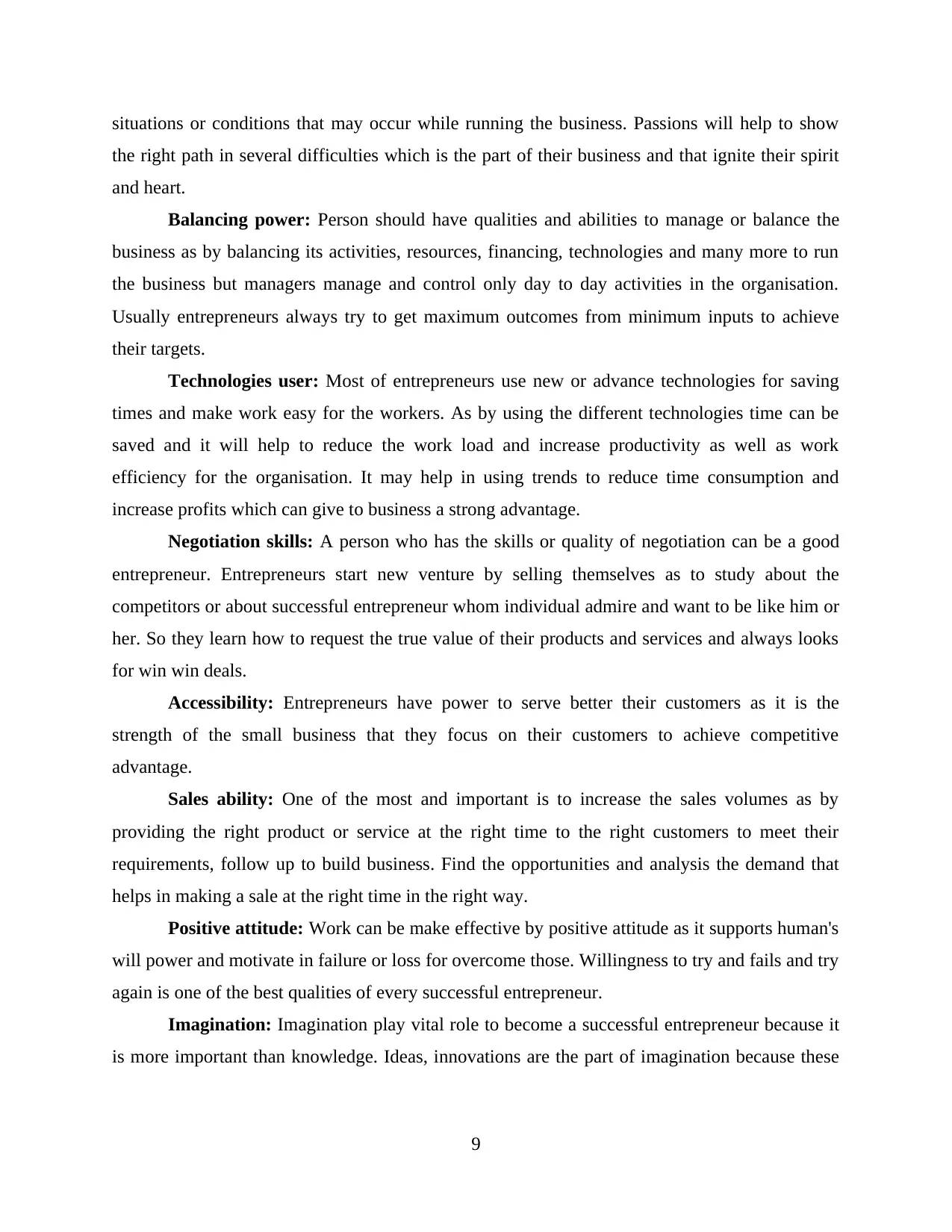
situations or conditions that may occur while running the business. Passions will help to show
the right path in several difficulties which is the part of their business and that ignite their spirit
and heart.
Balancing power: Person should have qualities and abilities to manage or balance the
business as by balancing its activities, resources, financing, technologies and many more to run
the business but managers manage and control only day to day activities in the organisation.
Usually entrepreneurs always try to get maximum outcomes from minimum inputs to achieve
their targets.
Technologies user: Most of entrepreneurs use new or advance technologies for saving
times and make work easy for the workers. As by using the different technologies time can be
saved and it will help to reduce the work load and increase productivity as well as work
efficiency for the organisation. It may help in using trends to reduce time consumption and
increase profits which can give to business a strong advantage.
Negotiation skills: A person who has the skills or quality of negotiation can be a good
entrepreneur. Entrepreneurs start new venture by selling themselves as to study about the
competitors or about successful entrepreneur whom individual admire and want to be like him or
her. So they learn how to request the true value of their products and services and always looks
for win win deals.
Accessibility: Entrepreneurs have power to serve better their customers as it is the
strength of the small business that they focus on their customers to achieve competitive
advantage.
Sales ability: One of the most and important is to increase the sales volumes as by
providing the right product or service at the right time to the right customers to meet their
requirements, follow up to build business. Find the opportunities and analysis the demand that
helps in making a sale at the right time in the right way.
Positive attitude: Work can be make effective by positive attitude as it supports human's
will power and motivate in failure or loss for overcome those. Willingness to try and fails and try
again is one of the best qualities of every successful entrepreneur.
Imagination: Imagination play vital role to become a successful entrepreneur because it
is more important than knowledge. Ideas, innovations are the part of imagination because these
9
the right path in several difficulties which is the part of their business and that ignite their spirit
and heart.
Balancing power: Person should have qualities and abilities to manage or balance the
business as by balancing its activities, resources, financing, technologies and many more to run
the business but managers manage and control only day to day activities in the organisation.
Usually entrepreneurs always try to get maximum outcomes from minimum inputs to achieve
their targets.
Technologies user: Most of entrepreneurs use new or advance technologies for saving
times and make work easy for the workers. As by using the different technologies time can be
saved and it will help to reduce the work load and increase productivity as well as work
efficiency for the organisation. It may help in using trends to reduce time consumption and
increase profits which can give to business a strong advantage.
Negotiation skills: A person who has the skills or quality of negotiation can be a good
entrepreneur. Entrepreneurs start new venture by selling themselves as to study about the
competitors or about successful entrepreneur whom individual admire and want to be like him or
her. So they learn how to request the true value of their products and services and always looks
for win win deals.
Accessibility: Entrepreneurs have power to serve better their customers as it is the
strength of the small business that they focus on their customers to achieve competitive
advantage.
Sales ability: One of the most and important is to increase the sales volumes as by
providing the right product or service at the right time to the right customers to meet their
requirements, follow up to build business. Find the opportunities and analysis the demand that
helps in making a sale at the right time in the right way.
Positive attitude: Work can be make effective by positive attitude as it supports human's
will power and motivate in failure or loss for overcome those. Willingness to try and fails and try
again is one of the best qualities of every successful entrepreneur.
Imagination: Imagination play vital role to become a successful entrepreneur because it
is more important than knowledge. Ideas, innovations are the part of imagination because these
9
⊘ This is a preview!⊘
Do you want full access?
Subscribe today to unlock all pages.

Trusted by 1+ million students worldwide
1 out of 15
Related Documents
Your All-in-One AI-Powered Toolkit for Academic Success.
+13062052269
info@desklib.com
Available 24*7 on WhatsApp / Email
![[object Object]](/_next/static/media/star-bottom.7253800d.svg)
Unlock your academic potential
Copyright © 2020–2026 A2Z Services. All Rights Reserved. Developed and managed by ZUCOL.





